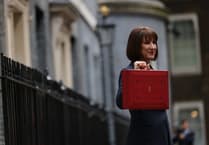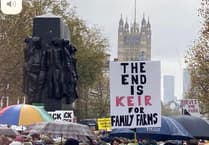From wartime evacuations to cup final day, Waterloo station has seen a few sights over the years.
But you would think the grand London terminus was in the middle of a rural hinterland, rather than one of the world’s great capitals, judging by the attire of many passengers who arrived there on Tuesday morning.
Barbour jackets, checked shirts and wellies were the clothing of choice as the service from Portsmouth Harbour pulled into platform 14 at 10.40am.
Among the passengers were Gwen Woodruffe and her farming chums from Petersfield as they joined counterparts from afar as Sutherland in the far north of Scotland and Northern Ireland to protest against the so-called “tractor tax” and a budget that many have called “the final straw” against their livelihood.

“We’ve got to make a stand – there’s quite a few of us that have come up today,” said Gwen, who has taken the industry to heart since marrying into the farming life.
“I don’t know what sort of figures we’re looking at but there could be anything from 10,000 to 40,000.”
The figure turned out to be closer to the former, but as the visitors from East Hampshire made their way across the Thames and past Charing Cross, it was clear this was not the average jolly to London. Random people gave the visitors fist-pumps on The Strand, and whistles and cheers were raised as a tractor driver sounded a triumphant horn on the corner of Trafalgar Square.

Gwen quickly became one of the ringleaders, coercing a group of agricultural college students into a round of “everywhere we go… we’re the farmers” as the tightly-packed audience waited for the opening addresses and the march to Parliament Square.
Some perched on street furniture and window ledges on surrounding government buildings as the rain fell with NFU president, Tom Bradshaw, eventually taking to the stage after a delay. Although there were some boos when he confirmed the march’s cancellation, his words struck a chord with the baying crowd.
“Why do we farm?” he asked after a minute’s silence for every farmer no longer with us.
“Why do we accept low prices and long hours? Why do we put up with the weather?
“We farm because we feed the nation. We farm because it’s in our blood and we farm because we love it.
“We are used to stress and strains and dealing with problems, but they usually involve weather and markets, not our own government.
“But if they think we’re going to back down, they can think again.”

The march – one of two protest events taking place on the day – was called after Chancellor Rachel Reeves announced changes to inheritance tax for farmers in her October budget.
The changes mean from April 2026 that inherited agricultural assets worth more than £1million, and which were previously exempt, will be liable for 20 per cent tax.
Labour insist the changes will not impact the majority of farmers as estates worth up to £3million can still be passed on by a couple, completely free of inheritance tax.
Farmers will also pay less 50 per cent less inheritance tax than “everyone else” and heirs can spread payments over ten years. They also insist the policy is about “protecting smaller family farms” while ensuring the wealthiest landowners “pay their fair share.”
The chancellor claims about 500 farms a year will be subject to the tax, while the NFU fears it could be far higher when land, machinery, buildings and other assets are taken into account.
They claim that even modest and smaller farms could be hit – with some suggesting that 75 per cent of commercial farms with more than 20 hectares could be affected.
Bob Wilton, who has diversified his Kilnside Farm near Runfold over the years to include dexter cows, sheep and cider trees, fears the tax will force his son away from farming.

He said: “The inheritance changes will almost certainly mean my son will have to leave the business completely and that we may have to dispose of agricultural land.
“The government’s figure is misplaced because it includes things that don’t affect inheritance tax.
“What are we going to do? Turn it over to rewilding? So all the agricultural land, particularly in Surrey, will be turned over to brambles and birds.”
Some speakers like Martin Williams feel the spectre of inheritance tax will dissuade farmers from reinvesting in their land and processes, for fearing it will increase value and thus pass the threshold.
Ian Constable, of Street Croft Farm near Herriard, also took part in the protest and felt the speakers covered all the issues raised by the “reckless” budget.
He said: “We have a smallish farm, it’s not big at all, we rear lamb, poultry, a small amount of beef, pigs and everything we produce go through our own shop.
“The worry is we could lose it all if our landlord decides he can’t afford to keep the farm and pay the 20 per cent tax. Our farm could be one that’s sold and that’s a big worry.”
Lottie Anne, who grew up in Farnham, has been working with livestock since she was 15 and now works and lives on a nearby dairy farm.
“I’ve always been proud to be a small part of the farming community,” said Lottie, who called the march “incredibly moving”.
“I stood for my friends who I see working hard, 365 days a year, in the hope of leaving their children a sustainable, profitable farm business.
“Despite what the government claims, it will have a huge impact on farming families. But we have so many taxes and hoops always coming in, and many feel the inheritance tax is the final straw.”

Indeed, the words “final straw” were commonplace around Whitehall as many felt compelled to take to the streets in a response to a perceived anti-rural agenda.
The biggest cheer of the day – except from the encouraged roar towards the surrounding government buildings by a speaker – was, unsurprisingly, for Jeremy Clarkson.
Tanked up on codeine and paracetamol and defying doctor’s orders to attend the rally, Jezza drew empathy from his audience and left to a rousing, but simple, plea to Rachel Reeves to think again.
He said: “I know a lot of people took a bit of a kick on the shin with that budget, but you lot got a knee in the nuts and a hammer blow to the back of the head.”
The 64-year-old concluded: “I beg of the government to be big and accept this was rushed through.
“It wasn't thought out and it was a mistake. That's the big thing to do.”

The crowd began to disperse soon afterwards, but Gwen didn’t head back to Waterloo. She ended up helping to co-ordinate the huge load that farmers donated to food banks on the day with City Foodbank being “overwhelmed by the donation”.
Her “everywhere we go” chant that reverberated around the South Bank and Whitehall a few hours earlier included the line “people want to know, who we are.”
“We’re the farmers”, they shouted back. People definitely heard them.





